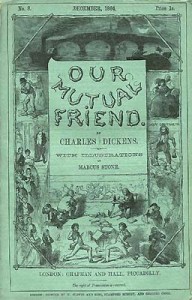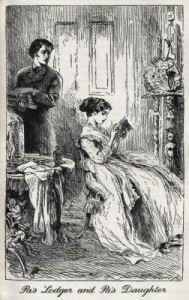Our Mutual Friend
 Our Mutual Friend by Charles Dickens is one of those books that was just meant to be read aloud. Literally. Dickens considered himself the novelist of the common man and his works were originally published in the relatively inexpensive serialized form. I heard that in nineteenth century England, whole neighborhoods would go in together to purchase a copy for the local pub, and that families would crowd in expectantly in anticipation of a fabulous rendition compliments of the designated reader—that being, someone that could actually read.
Our Mutual Friend by Charles Dickens is one of those books that was just meant to be read aloud. Literally. Dickens considered himself the novelist of the common man and his works were originally published in the relatively inexpensive serialized form. I heard that in nineteenth century England, whole neighborhoods would go in together to purchase a copy for the local pub, and that families would crowd in expectantly in anticipation of a fabulous rendition compliments of the designated reader—that being, someone that could actually read.
Reading Dickens quietly to oneself is a fantastic journey into an exquisitely plotted world. But reading Dickens out loud is the actual living in it. Philip and I read Our Mutual Friend together last winter and it was a magical few weeks of fireside evenings and theatrical voices and frenzied breakfast table speculations. I even found myself so carried away by the quandaries in which all our new friends had found themselves that I hastily appended Philip’s suppertime grace one night with a quick appeal for their fates.
Our Mutual Friend is characteristically peopled by a cast of remarkable (and aptly-named!) characters, from the little crippled doll-maker, Jenny Wren to the wolf-like longshoreman, Rogue Riderhood. Who can forget the newly-risen society couple, the Veneerings? Or their adorable counterparts, Mr. and Mrs. Boffin? “Fascination” Fledgby or the indefatigable Podsnaps? At it’s simplest, Our Mutual Friend is the story of a young heir presumed dead and given the unique opportunity to observe the impact of such upon those affected by the redistribution of his fortune—including the lovely Bella Wilfer, whom he was literally willed to marry. But no story of Dickens is simple. He will move heaven and earth to weave together every single echelon of society, interconnected and interdependent, into an absolute miracle of coincidence and chance and glorious intention, taking his readers from the slums of London to the glittering drawing rooms of would-be MPs to the haunts of ‘waterside characters’ along the Thames.

For it’s none other than the Fairy Tale.
Looking back over the novel I could see it all: fairy godmothers; an ornery mother and sisters set against a princess-in-exile; wolves that can’t quite keep to their disguises. There’s even the thread running through it of my most favorite fairy tale of all, Rapunzel. (High marks to those who can identify it ;)) And like all true fairy tales, Our Mutual Friend confronts the problems of evil and pain. The characters suffer—both by their own hand and by the consequences of others’ actions. There’s anguish and growth and excruciating choices. But the ennobling power of love flaps over the story, like a standard straight against the wind.
And that makes all the difference.
So, she leaning on her husband’s arm, they turned homeward by a rosy path which the gracious sun struck out for them in its setting. And O there are days in this life, worth life and worth death. And O what a bright old song it is, that O ’tis love, ’tis love, ’tis love that makes the world go round!
Charles Dickens, Our Mutual Friend

Oh! I saw the mini-series earlier this year, and on a recent trip to the used bookstore I picked up a lovely hardback copy of the book, and I just started reading it this week. Several times I find myself chucking over narrations of the characters thoughts – Mr. Twemlow’s anguish over whether he is Veneering’s oldest or newest friend, or the potboy at the Six Jolly Fellowship-Porter’s remarking that “he hadn’t been so rattled to bed since his late mother had systematically accelerated his retirement to rest with a poker.” At any rate, I adore Dickens’ writing. I have an idea on the Rapunzel connection… but I’ll wait until I finish the book. 🙂
This has absolutely inspired me! I’m definitely going to want to read Dickens aloud with my husband. Thanks for the review, Lanier! Reading your pieces is bliss!
I love Dickens’ books! This makes me want to read them again!
Oh how fun! Adding this one to my reading list. I got stuck half way through Great Expectations and never finished it. But I do admire and respect Dickens, and you’ve made this particular book sound so interesting, I’m willing to have another go at him. 🙂
This is my favourite Dickens! I really enjoyed the BBC film version of it.
I must admit that I saw the BBC series before I read the book. In fact, I haven’t yet read the book. *blush*
But I plan to this year; it’s on my list and I can’t wait.
With that being said, my brother read it last year and really enjoyed it.
I’d have to say that the movies was my favorite of Dickens.
That book is on my list of the next ten books I should read (I do have such a huge list!) I have watched the miniseries and LOVE it (the rest of my family hates it! 😮 ) I’ve heard a lot of people don’t like the storyline, but I think it is quite wonderful and there is so much to learn from it as well. I especially loved watching Bella change!
One of my all time favorite books! I forced myself to read it before watching the miniseries and still never watched . . . but reading was enough!
Thanks for the lovely review, Lanier! I’ve only seen the miniseries of Our Mutual Friend – glad to know the book is just as wonderful, and probably more so. I’ll have to put that on my list. 🙂